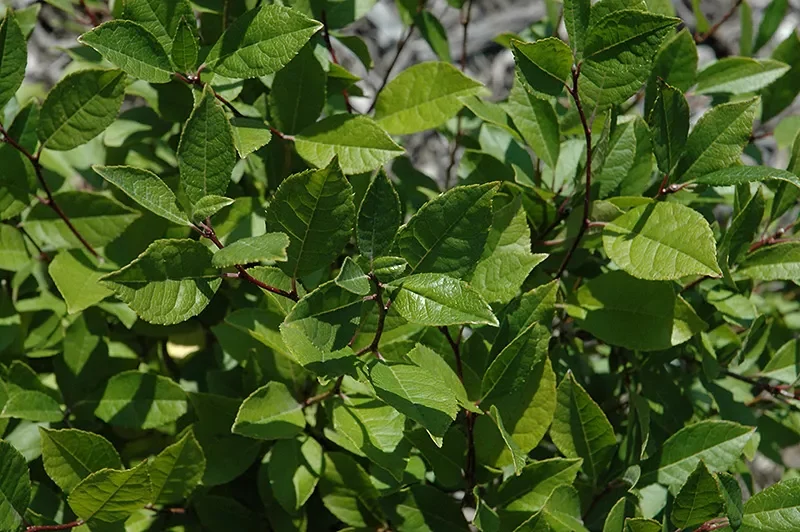Family: Holly
Type: Shrub
Other Common Name: Black Alder

Jim Dandy Holly, scientifically known as Ilex verticillata ‘Jim Dandy’, is a deciduous holly valued for its ability to produce abundant red berries. It is primarily grown as a male pollinator for female winterberry hollies.
Compact and hardy, Jim Dandy Holly is characterized by its small, glossy green leaves and a rounded growth habit. This shrub is particularly important for its role in ensuring the pollination of female winterberry plants.
Thriving in full sun to partial shade, Jim Dandy Holly is hardy in zones 4-9. It’s adaptable to various soil types but prefers wet, well-draining acidic soils.
Hardiness Zone: 3b-3a
Pet Friendly: Yes
Moisture Preference: Moist to wet
Sun Needs: Full sun to partial shade
Growth Rate: Slow
Average Height (feet): 10
Average Spread (feet): 8
Average Life Span (years): 40
Form: Oval
Foliage Color: Green
Foliage Shape: Pointy
Bark Color: Brown
Bark Texture: Smooth
Incorporating Jim Dandy Holly into your landscape serves a functional as well as aesthetic purpose. Its presence is crucial for the pollination of female winterberry hollies, ensuring their vibrant berry display.
This shrub is ideal for mixed borders, woodland gardens, or as a naturalistic planting. It’s especially effective when planted near female winterberry hollies to enhance berry production.
Despite its modest appearance, Jim Dandy Holly is a vital component of the garden. It’s a great choice for gardeners who appreciate plants that offer both beauty and utility.

In a woodland garden, Jim Dandy Holly adds a natural and understated element. Its adaptability to shade and natural growth habit make it an ideal choice.
For rain gardens, this holly's preference for wet conditions is a perfect match. It helps create a thriving ecosystem in moisture-rich areas.
In wildlife gardens, Jim Dandy Holly attracts birds with its berries. Although it doesn't produce berries itself, its role in pollinating female winterberries is invaluable.
Plant it alongside female winterberry hollies. Its presence ensures a bountiful berry crop on the female plants, which is both beautiful and beneficial for wildlife.
Use it as a foundational plant in native gardens. Its natural growth and low maintenance make it suitable for gardens that focus on native plantings.
Combine it with other moisture-loving shrubs in a rain garden setting. It contributes to the overall health and aesthetic of water-efficient landscapes.
Select our pre-made garden layouts to create a landscape that’s uniquely yours. Simple, smart, and customizable!
In spring, Jim Dandy Holly begins to grow its leaves, setting the stage for the pollination of female winterberry hollies.
During summer, the plant maintains its green foliage, providing a steady backdrop in the landscape.
In the fall, while Jim Dandy Holly doesn't produce berries itself, its role in pollinating nearby female winterberries becomes evident as they display their vibrant berries.
In winter, Jim Dandy Holly loses its leaves but stands as a crucial component in the winter landscape, especially in gardens that feature female winterberry hollies.
Jim Dandy Holly should be planted in areas with full sun to partial shade. It’s ideal for spaces near female winterberry hollies, as its presence is crucial for their berry production.
This plant thrives best in full sun to partial shade. While it can tolerate a range of light conditions, sufficient sunlight encourages healthy growth and effective pollination.
Jim Dandy Holly prefers acidic, well-draining soil. It's adaptable to various soil types but thrives in moist conditions, making it suitable for wetland or rain gardens.
Space Jim Dandy Holly plants about 4 to 6 feet apart. This spacing allows for proper growth and ensures effective pollination of nearby female winterberry hollies.
Regular watering is important, especially in dry conditions and during the first growing season. Once established, Jim Dandy Holly is quite tolerant of wet conditions.
Fertilize in early spring with an acid-forming fertilizer to encourage healthy growth and maintain soil acidity.
Minimal pruning is needed. If desired, prune in late winter or early spring to shape the plant or control its size.
In spring, apply a fresh layer of mulch and start regular watering and fertilizing as new growth appears.
Maintain moisture during summer, especially in dry periods. Monitor for pests and diseases, treating as necessary.
Reduce watering in the fall as the plant begins to go dormant. Prepare the plant for winter by cleaning up any fallen leaves.
Jim Dandy Holly is hardy in winter. Ensure it's well-mulched to protect the roots in colder climates.
Jim Dandy Holly typically reaches about 3-6 feet in height and 2-3 feet in width, forming a compact, rounded shape.
While no plant is completely deer-proof, Jim Dandy Holly is relatively deer-resistant and less likely to be damaged compared to other shrubs.
Jim Dandy Holly is a male plant and does not produce berries. It is primarily used to pollinate female winterberry hollies, which produce the berries.
Sign up below to get exclusive deals, discounts, and new plant collections—delivered straight to your inbox! Plus, stay inspired with the latest gardening tips, landscaping trends, and DIY garden ideas. Start growing with us today!
A big thank you for subscribing to the PBN Design newsletter.
We're thrilled to have you join our community. Get ready for exciting updates, insightful content, and more delivered straight to your inbox.
Stay tuned!
Go backA big thank you for subscribing to the PBN Design newsletter.
We're thrilled to have you join our community. Get ready for exciting updates, insightful content, and more delivered straight to your inbox.
Stay tuned!
Go back